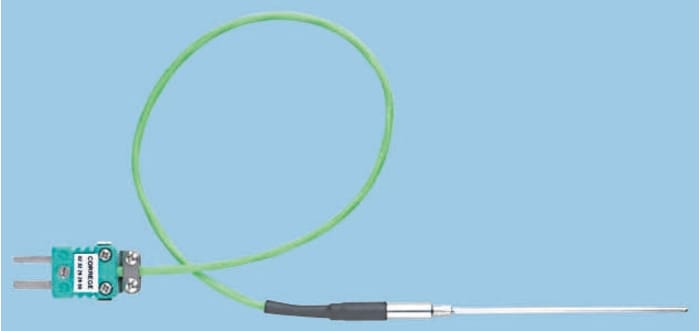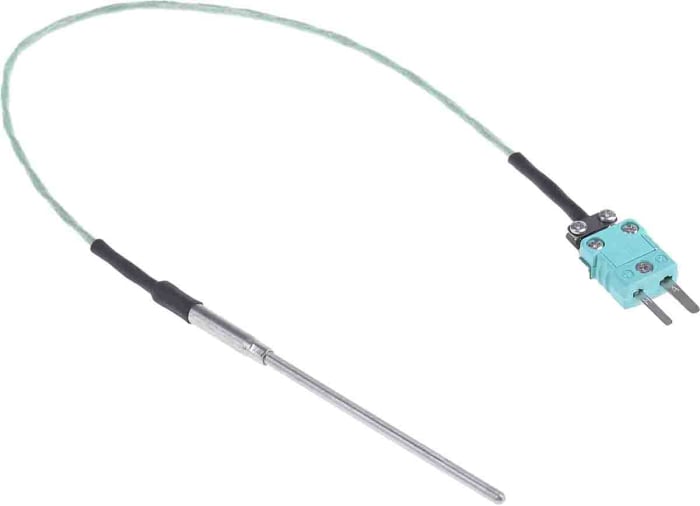RS PRO Type K Thermocouple 70mm Length, 2mm Diameter → +700°C

Technical Document
Specifications
Brand
RS ProThermocouple Type
K
Probe Diameter
2mm
Probe Length
70mm
Probe Material
Stainless Steel
Maximum Temperature Sensed
+700°C
Termination Type
Miniature Plug
Cable Length
300mm
Standards Met
RoHS Compliant
Response Time
0.7 s
Country of Origin
France
Product details
RS Pro IEC Mineral Insulated Type K Thermocouple with Stainless Steel Probe and Miniature Connector
From RS Pro a range of type K thermocouple temperature sensors or probes that conform to IEC 584 standards. These thermocouple temperature probes have a durable construction and feature a stainless steel mineral insulated flexible probe sheath that can be bent and formed to suit a wide range of applications. The thermocouple cable has a fibreglass insulation and is surrounded by a durable 316 stainless steel braid. At one end of the thermocouple is a miniature MARLIN type connector which allows the thermocouple to be quickly and easily connected. The ungrounded hot junction of these thermocouple probes means they are able to perform with a reduction in electrical interference
How does a Thermocouple Work?
A thermocouple is a sensor used to measure temperature in a range of different processes and consists of two wire legs made from different metals joined together at their two ends to form two junctions. The hot, or measuring junction is connected to the body whose temperature is going to be measured. The cold junction or reference junction is connected to a body of known temperature. When the measuring junction is placed on something hot a voltage or potential difference between this and the reference junction occurs. This voltage can then be converted into a temperature measurement using thermocouple reference tables. This process is also known as the Seebeck Effect
What is an Insulated Junction?
An insulated or ungrounded junction is where the thermocouple wires are welded together and fully covered by but insulated from the outer protective sheath, often by the use of mineral insulation. The advantage of this is that there is a reduction in electrical interference and a stable reading
What is Mineral Insulation?
Mineral insulation is used to insulate the thermocouple wires from one another and from the metal probe sheath that surrounds them. The sheath is filled with a highly compacted magnesium oxide powder that prevents the conductors from making contact with one another other than at the fixed junction. The high density of the mineral powder enables the thermocouple to have a rapid response as it promotes a fast heat transfer between the conductor and the sheath. Mineral insulation also helps to protect the thermocouple wire from environmental damage including corrosion, prevents electrical interference and allows the cable to be flexible whilst maintaining its mechanical strength
Key Features and Benefits
• Ungrounded hot junction for reduced electrical interference
• Mineral insulation for rapid response, flexibility and durability
• Miniature plug termination for quick and easy connection
• Conforms to IEC 584 standards
• Flexible, can be bent into shape for easy installation
• Robust glassfibre insulated cable with stainless steel braid
• Durable stainless steel sheath for corrosion resistance
Applications
Type K Thermocouples (Nickel-Chromium / Nickel-Aluminium) are the most common type of thermocouple and are both accurate and flexible with a wide temperature range. Typical applications for these mineral insulated Type-K thermocouple probes include heat exchangers, power stations, brick and cement kilns, heat treatment and annealing furnaces, thermostats, food thermometers, vehicle diagnostics and in laboratory applications
Stock information temporarily unavailable.
Please check again later.
P.O.A.
1
P.O.A.
1
Technical Document
Specifications
Brand
RS ProThermocouple Type
K
Probe Diameter
2mm
Probe Length
70mm
Probe Material
Stainless Steel
Maximum Temperature Sensed
+700°C
Termination Type
Miniature Plug
Cable Length
300mm
Standards Met
RoHS Compliant
Response Time
0.7 s
Country of Origin
France
Product details
RS Pro IEC Mineral Insulated Type K Thermocouple with Stainless Steel Probe and Miniature Connector
From RS Pro a range of type K thermocouple temperature sensors or probes that conform to IEC 584 standards. These thermocouple temperature probes have a durable construction and feature a stainless steel mineral insulated flexible probe sheath that can be bent and formed to suit a wide range of applications. The thermocouple cable has a fibreglass insulation and is surrounded by a durable 316 stainless steel braid. At one end of the thermocouple is a miniature MARLIN type connector which allows the thermocouple to be quickly and easily connected. The ungrounded hot junction of these thermocouple probes means they are able to perform with a reduction in electrical interference
How does a Thermocouple Work?
A thermocouple is a sensor used to measure temperature in a range of different processes and consists of two wire legs made from different metals joined together at their two ends to form two junctions. The hot, or measuring junction is connected to the body whose temperature is going to be measured. The cold junction or reference junction is connected to a body of known temperature. When the measuring junction is placed on something hot a voltage or potential difference between this and the reference junction occurs. This voltage can then be converted into a temperature measurement using thermocouple reference tables. This process is also known as the Seebeck Effect
What is an Insulated Junction?
An insulated or ungrounded junction is where the thermocouple wires are welded together and fully covered by but insulated from the outer protective sheath, often by the use of mineral insulation. The advantage of this is that there is a reduction in electrical interference and a stable reading
What is Mineral Insulation?
Mineral insulation is used to insulate the thermocouple wires from one another and from the metal probe sheath that surrounds them. The sheath is filled with a highly compacted magnesium oxide powder that prevents the conductors from making contact with one another other than at the fixed junction. The high density of the mineral powder enables the thermocouple to have a rapid response as it promotes a fast heat transfer between the conductor and the sheath. Mineral insulation also helps to protect the thermocouple wire from environmental damage including corrosion, prevents electrical interference and allows the cable to be flexible whilst maintaining its mechanical strength
Key Features and Benefits
• Ungrounded hot junction for reduced electrical interference
• Mineral insulation for rapid response, flexibility and durability
• Miniature plug termination for quick and easy connection
• Conforms to IEC 584 standards
• Flexible, can be bent into shape for easy installation
• Robust glassfibre insulated cable with stainless steel braid
• Durable stainless steel sheath for corrosion resistance
Applications
Type K Thermocouples (Nickel-Chromium / Nickel-Aluminium) are the most common type of thermocouple and are both accurate and flexible with a wide temperature range. Typical applications for these mineral insulated Type-K thermocouple probes include heat exchangers, power stations, brick and cement kilns, heat treatment and annealing furnaces, thermostats, food thermometers, vehicle diagnostics and in laboratory applications

